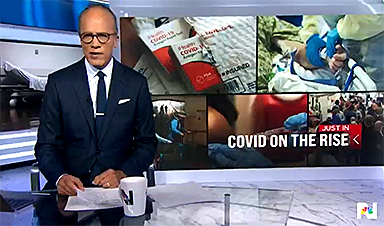Scientists can now show key differences in the blood of those who recover from Covid — and those who don’t.
More than three years into the pandemic, the millions of people who have suffered from long Covid finally have scientific proof that their condition is real.
Scientists have found clear differences in the blood of people with long Covid — a key first step in the development of a test to diagnose the illness.
The findings, published Monday in the journal Nature, also offer clues into what could be causing the elusive condition that has perplexed doctors worldwide and left millions with ongoing fatigue, trouble with memory and other debilitating symptoms.
The research is among the first to prove that “long Covid is, in fact, a biological illness,” said David Putrino, principal investigator of the new study and a professor of rehabilitation and human performance at the Icahn School of Medicine at Mount Sinai in New York.
Dr. Marc Sala, co-director of the Northwestern Medicine Comprehensive Covid-19 Center in Chicago, called the findings “important.” He was not involved with the new research.
“This will need to be investigated with more research, but at least it’s something because, quite frankly, right now we don’t have any blood tests” either to diagnose long Covid or help doctors understand why it’s occurring, he said.
Putrino and his colleagues compared blood samples of 268 people. Some had Covid but had fully recovered, some had never been infected, and the rest had ongoing symptoms of long Covid at least four months after their infection.
Several differences in the blood of people with long Covid stood out from the other groups.
The activity of immune system cells called T cells and B cells — which help fight off germs — was “irregular” in long Covid patients, Putrino said. One of the strongest findings, he said, was that long Covid patients tended to have significantly lower levels of a hormone called cortisol.
A major function of the hormone is to make people feel alert and awake. Low cortisol could help explain why many people with long Covid experience profound fatigue, he said.
“It was one of the findings that most definitively separated the folks with long Covid from the people without long Covid,” Putrino said.
The finding likely signals that the brain is having trouble regulating hormones. The research team plans to dig deeper into the role cortisol may play in long Covid in future studies.
Meanwhile, doctors do not recommend simply boosting a person’s cortisol levels in an attempt to “fix” the problem.
“There is no evidence that replacing cortisol in someone with long Covid would be a safe or effective thing to do,” Sala said.
The study also found that dormant viruses, such as the one that causes mononucleosis, Epstein-Barr, come alive again in long Covid patients. It’s unclear, however, whether those old viruses are causing symptoms or flagging a problem within the immune system.
“We were looking for signals, and we found them,” said Akiko Iwasaki, one of the researchers and a professor of immunobiology and molecular, cellular and developmental biology at the Yale School of Medicine. “Now what we need to do is home in on each of these signals and understand better how the disease has been driven by these signals.”
The investigators did not find significant evidence that long Covid is the result of an autoimmune disorder, in which the body attacks itself.

Dr. Clinton Wright, director of the National Institute of Neurological Disorders and Stroke’s division of clinical research, said additional studies will be necessary to find other ways Covid may lead to long-term symptoms. One theory is that the virus is hiding in brain tissue or other organs.
“We’re really interested in whether the virus still exists in reservoirs in the body,” he said. “It’s really hard to do that by measuring blood.” He was not involved with the new study.
Long Covid affects 1 in 13 U.S. adults, or 7.5%, according to the Centers for Disease Control and Prevention.
The findings offer hope to patients like Joshua Roman, 39, of New York City, who participated in the study.
“We’re in such a mysterious swamp of symptoms,” he said. “My long Covid treatment is just management of symptoms.”
Roman, a professional musician who plays the cello, takes daily medication to ease the lingering physical trembling that affects his ability to perform.
“It would be great if we could get to the thing that’s causing me to shake in the first place, but we still don’t know exactly what that is,” he said.
News
Treating a Common Dental Infection… Effects That Extend Far Beyond the Mouth
Successful root canal treatment may help lower inflammation associated with heart disease and improve blood sugar and cholesterol levels. Treating an infected tooth with a successful root canal procedure may do more than relieve [...]
Microplastics found in prostate tumors in small study
In a new study, researchers found microplastics deep inside prostate cancer tumors, raising more questions about the role the ubiquitous pollutants play in public health. The findings — which come from a small study of 10 [...]
All blue-eyed people have this one thing in common
All Blue-Eyed People Have This One Thing In Common Blue Eyes Aren’t Random—Research Traces Them Back to One Prehistoric Human It sounds like a myth at first — something you’d hear in a folklore [...]
Scientists reveal how exercise protects the brain from Alzheimer’s
Researchers at UC San Francisco have identified a biological process that may explain why exercise sharpens thinking and memory. Their findings suggest that physical activity strengthens the brain's built in defense system, helping protect [...]
NanoMedical Brain/Cloud Interface – Explorations and Implications. A new book from Frank Boehm
New book from Frank Boehm, NanoappsMedical Inc Founder: This book explores the future hypothetical possibility that the cerebral cortex of the human brain might be seamlessly, safely, and securely connected with the Cloud via [...]
Deadly Pancreatic Cancer Found To “Wire Itself” Into the Body’s Nerves
A newly discovered link between pancreatic cancer and neural signaling reveals a promising drug target that slows tumor growth by blocking glutamate uptake. Pancreatic cancer is among the most deadly cancers, and scientists are [...]
This Simple Brain Exercise May Protect Against Dementia for 20 Years
A long-running study following thousands of older adults suggests that a relatively brief period of targeted brain training may have effects that last decades. Starting in the late 1990s, close to 3,000 older adults [...]
Scientists Crack a 50-Year Tissue Mystery With Major Cancer Implications
Researchers have resolved a 50-year-old scientific mystery by identifying the molecular mechanism that allows tissues to regenerate after severe damage. The discovery could help guide future treatments aimed at reducing the risk of cancer [...]
This New Blood Test Can Detect Cancer Before Tumors Appear
A new CRISPR-powered light sensor can detect the faintest whispers of cancer in a single drop of blood. Scientists have created an advanced light-based sensor capable of identifying extremely small amounts of cancer biomarkers [...]
Blindness Breakthrough? This Snail Regrows Eyes in 30 Days
A snail that regrows its eyes may hold the genetic clues to restoring human sight. Human eyes are intricate organs that cannot regrow once damaged. Surprisingly, they share key structural features with the eyes [...]
This Is Why the Same Virus Hits People So Differently
Scientists have mapped how genetics and life experiences leave lasting epigenetic marks on immune cells. The discovery helps explain why people respond so differently to the same infections and could lead to more personalized [...]
Rejuvenating neurons restores learning and memory in mice
EPFL scientists report that briefly switching on three “reprogramming” genes in a small set of memory-trace neurons restored memory in aged mice and in mouse models of Alzheimer’s disease to level of healthy young [...]
New book from Nanoappsmedical Inc. – Global Health Care Equivalency
A new book by Frank Boehm, NanoappsMedical Inc. Founder. This groundbreaking volume explores the vision of a Global Health Care Equivalency (GHCE) system powered by artificial intelligence and quantum computing technologies, operating on secure [...]
New Molecule Blocks Deadliest Brain Cancer at Its Genetic Root
Researchers have identified a molecule that disrupts a critical gene in glioblastoma. Scientists at the UVA Comprehensive Cancer Center say they have found a small molecule that can shut down a gene tied to glioblastoma, a [...]
Scientists Finally Solve a 30-Year-Old Cancer Mystery Hidden in Rye Pollen
Nearly 30 years after rye pollen molecules were shown to slow tumor growth in animals, scientists have finally determined their exact three-dimensional structures. Nearly 30 years ago, researchers noticed something surprising in rye pollen: [...]
How lipid nanoparticles carrying vaccines release their cargo
A study from FAU has shown that lipid nanoparticles restructure their membrane significantly after being absorbed into a cell and ending up in an acidic environment. Vaccines and other medicines are often packed in [...]





















